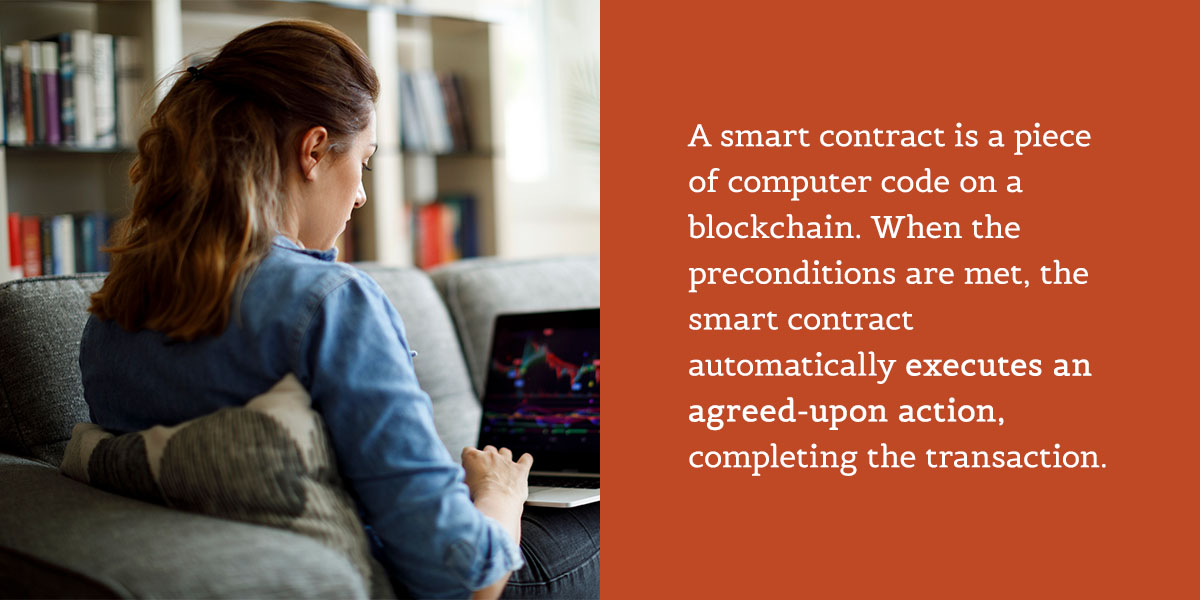If you have been following the news around Web3 lately, you may have heard of smart contracts. They are used in a wide variety of decentralized digital transactions, including NFT sales, decentralized autonomous organizations (DAOs), and decentralized applications (dApps).
Because smart contracts can relieve some of the hassle involved with traditional contracts, many businesses are incorporating them in their everyday transactions, like supply chain handoffs and insurance payments. But this raises the question — are smart contracts legal documents? And are they enforceable?
As blockchain technology continues to evolve, state, local, national, and international jurisdictions will need to determine whether and to what extent smart contracts are legally enforceable contracts in the traditional sense.
What Is a Smart Contract?
A smart contract is usually defined as a piece of computer code that exists on a blockchain and is often self-executing in some way. When certain predefined conditions are met, the smart contract automatically executes an agreed-upon action.
For example, in an NFT sale, a smart contract will exchange the buyer’s payment for the seller’s rights in the NFT. In a more complicated version of this transaction, the smart contract might automatically release royalty payments to the original artist when someone purchases an NFT of their work in a secondary sale of the NFT.
Some smart contracts require input from an external source, called an oracle, which is a data stream that alerts the smart contract to execute its code after one or more of the required conditions have been satisfied. This is why smart contracts are commonly referred to as digital escrow agents.
How Do Smart Contracts Relate to Blockchain?
Most sources define blockchain as a digital ledger that permanently records these transactions in “blocks” of linked data. When the smart contract is executed, the software protocol creates an immutable (unchangeable) record of the transaction, linking it to the block of prior transactions in that blockchain. The cryptographic links between each block make it virtually impossible to go back and edit or delete prior transaction data.
The Ethereum blockchain is the most popular blockchain today. Most smart contracts run on the Ethereum blockchain or one of its derivative chains. Many Web3 developers today work to make their smart contract protocols interoperable across the most popular blockchains.
Are Smart Contracts Legally Binding?
A smart contract can be a legally binding agreement, but for it to be legally binding depends on several factors. First, has to meet the core definition of a contract: a meeting of the minds with an exchange of consideration (something that both sides are either giving up or receiving). In most jurisdictions, there is no requirement that a contract must be in writing. In this regard, smart contracts go above the minimum threshold requirements.
Second, once an initial contract has been established, then the terms of the contract need to be identifiable. That can be an extremely difficult and expensive task in a handshake agreement, but it is easier the more the contract’s terms are written in a clear fashion. Many contracts do not contain essential terms that make up a good or great contract.
Third, a smart contract should meet the applicable criteria for an enforceable electronic agreement:
- Offer, acceptance, consideration: As discussed above, one or both parties offer the terms of the agreement, which both parties accept. This agreement must offer something of value to each party, which may be monetary value or intangible value.
- Legally permissible terms: The contract is only enforceable if it includes terms that are legal to enforce. This is especially important when considering smart contracts that constitute part of the dark web.
- Eligible for e-signatures: The document must be eligible for valid e-signatures according to the applicable jurisdictions (usually where one or all of the parties are situated).
In the US, the Uniform Commercial Code (UCC) indicates that an agreement does not have to be in writing to be enforceable. This means that, in general, electronic contracts will be legally enforceable. The following legislation can help determine whether this applies to specific smart contracts.
The E-SIGN Act
According to the federal Electronic Signatures in Global and National Commerce (E-SIGN) Act, electronic records and signatures are legally enforceable as long as they meet the following criteria:
- All parties intended to sign
- All parties consented to do business using electronic methods
- Records show the association of the signature with the transaction
- All parties retain a copy of the transaction records
Essentially, as long as a document is eligible for e-signatures, legal parties cannot deny an electronic document’s legal effect simply because it only exists in electronic form. Some documents and scenarios are exceptions to this general rule. Electronic signatures may not be permitted in some jurisdictions, including in circumstances surrounding:
- Court orders
- Wills and other estate documents
- Toxic material transfer documents
- Family law documents
- Utility service cancellations
- Product recall notices
- Insurance termination notices
- Foreclosure, default, or eviction notices
However, with the acceleration of technology adoption during the Covid-19 pandemic, many jurisdictions have become more flexible on the use of electronic signatures.
But are smart contracts legal documents under this act?
The Uniform Electronic Transactions Act
According to the US Uniform Electronic Transactions Act (UETA), electronic records and signatures hold the same legal status as paper documents and physical signatures. Generally speaking, an electronic record is anything stored electronically. It makes sense, then, that smart contracts would fall under this classification.
Fourty-nine states, Puerto Rico, the U.S. Virgin Islands, and Washington, D.C., have adopted the UETA. Only a handful of states have amended their UETA codes to include blockchain records as electronic records. Other states are likely to follow suit as Web3 technologies become more widespread. These will not necessarily impact the enforceability of smart contracts but will aid in their perception and recognition by parties, judicial bodies, and other dispute resolution forums.
Ultimately, a smart contract can be legally binding, but it may not have to be if it is not intended to serve the same purpose as a traditional contract. In this regard, the “meeting of the minds” between the contracting parties will play an integral role in its interpretation.
How are Smart Contracts Perceived Globally?
The US’ regulatory model of being “open for business” translates well into the smart contract arena. In other jurisdictions, such as Europe, smart contracts are also being widely recognized. Under the EU’s electronic signature law (eIDAS), three tiers of electronic signatures are recognized, each with varying levels of recognition.
These vary from standard electronic signatures to advanced electronic signatures and then to qualified electronic signatures. Qualified electronic signatures incorporate heightened identity verification procedures and security measures, such as encryption.
Smart contracts incorporate varying measures, based on their protocol, and can easily fit into one or more of these categories of electronic signatures. In jurisdictions where electronic signatures have been adopted, smart contracts will generally not require additional legislation to foster their adoption and enforcement.
Legal Issues With Smart Contracts
Because smart contracts are often intended to be permanent, unchangeable (immutable), and automatic, they pose legal, business, and ethical concerns that do not apply to standard paper contracts.
Negotiation and Interpretation
A smart contract is essentially a packet of computer code. Unlike conventional contracts, smart contracts leave no room for ongoing negotiations or interpretation. Both parties have to completely agree on the terms in the agreement before transferring it to the blockchain.
Because computers cannot generally handle vague phrasing and open interpretation like human brains, smart contracts work best in one-off transactions or transactions that have some repetitive and easily measurable or verifiable factors. AI-enabled smart contracts may eventually fill this gap.
However, currently this objectivity requirement can cause issues after the smart contract is executed if the parties realize they neglected some term or there are errors in the code that affect how the contract executes the actions.
Precision and certainty are essential when deciding smart contract terms and conditions. It can help to have an attorney on your side who has experience with Web3 law so they can make sure your agreement is clear and appropriately scoped to the transaction before it is deployed to the blockchain. In some instances, you may want to include a wraparound contract to supply crucial contract terms that were not included in the original smart contract protocol.
Permanence
Once the parties execute a transaction through a smart contract, there is generally no going back. For parties using a third party’s smart contract protocol, there is no undoing the contract or modifying its terms. This is referred to as “disintermediation,” which is web3 speak for “cut out the middle person/people.” In this scenario, the only way to modify the transaction is to cancel the previous transaction and create a new one using the updated terms.
However, for parties that have deployed their own smart contract, the party holding the private keys to the contract can modify the contract if the code allows it and the parties agree on how the smart contract should be modified.
Execution
Every contract requires that both parties fulfill their obligations according to the terms and conditions. If either side fails to uphold their end of the bargain, they breach the contract. Because smart contracts automatically execute predefined actions when they meet specific conditions, they significantly reduce the risk of contract breaches. As discussed above, this is more likely to succeed in a one-off transaction or a series of predictable transactions rather than an ongoing, fluid contractual relationship.
However, automatic execution can be an issue if there is an error in the code that causes damage to one party. It is also possible for loopholes to appear in smart contracts, which could create serious security risks for businesses using a public blockchain. Many vulnerabilities appear either in software or hardware that connects to a blockchain. These are called endpoint vulnerabilities or bridge vulnerabilities.
Just look at what happened to the AkuDreams developer team at the end of 2022, when an anonymous user managed to exploit a smart contract vulnerability during an NFT auction, which permanently locked $33 million in Ether on the blockchain. Using a private blockchain and seeking professional expertise can help prevent this kind of damage from affecting your company. Most existing web3 vulnerabilities are well known by the current web2 security experts.
Will Smart Contracts Replace Traditional Contracts?
While it is not likely, it is certainly possible that smart contracts could replace conventional contracts in some applications, even in well-established industries. Some companies are already using them, and experts expect increasing adoption over the coming years.
Because most states and nations are still in the process of determining how they will enforce smart contracts, businesses should consider taking a hybrid approach to complex agreements, at least until we see clearer legislation. In addition to the blockchain execution code, both parties should maintain a text version of the terms that they can refer to. They may also want to include a wraparound agreement that contains additional language to address unforeseeable consequences. It will feel redundant to some extent, but it is also common to utilize a master agreement to govern ongoing relationships.
Technology continues to change rapidly, and the prevalence of contracts in our world means that virtually every industry (even law firms) will need to adapt. Where do you think smart contracts are heading? Stay tuned to learn more about this emerging technology!


























